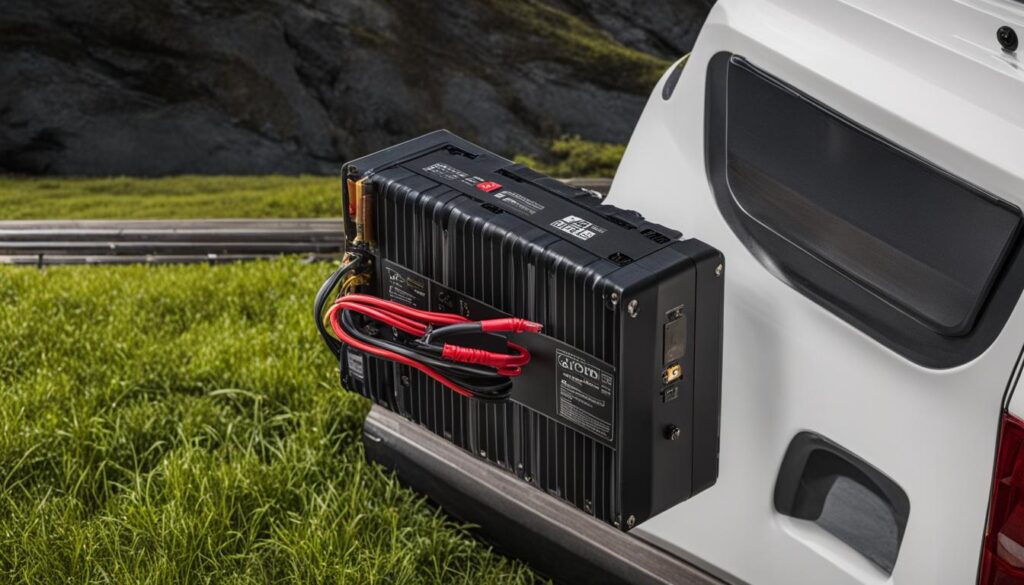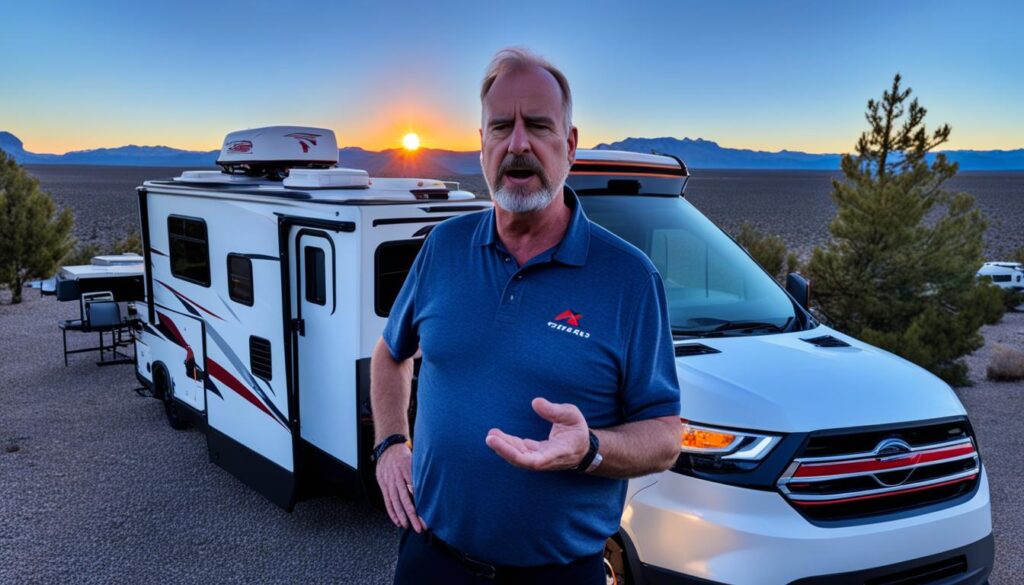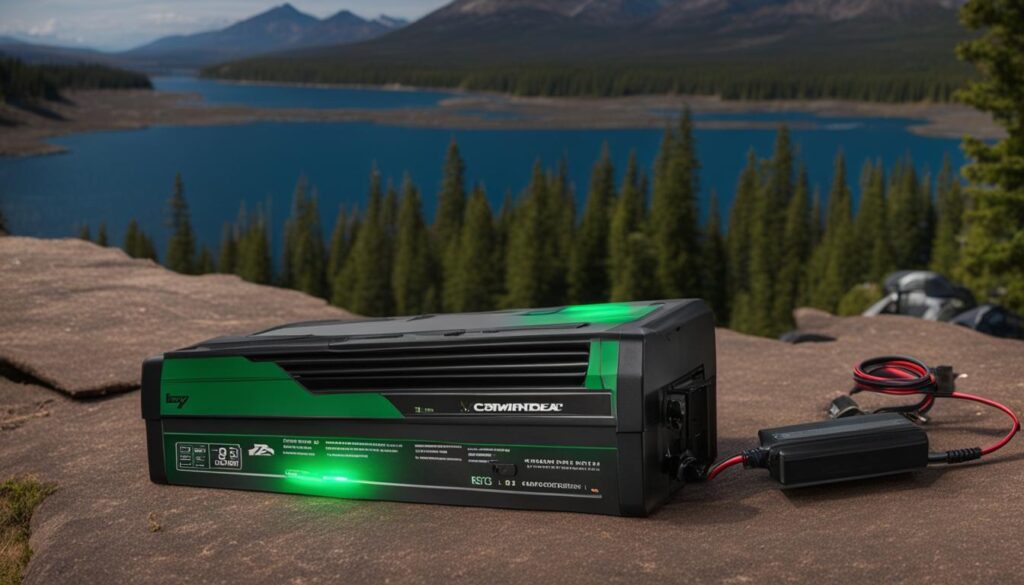Are you unsure whether your RV converter is effectively charging your battery? Understanding the signs that indicate a functioning converter is crucial for maintaining your RV’s power supply. In this article, we will explore the key indicators that reveal whether your RV converter is charging your battery or not.
Key Takeaways:
- Check if the indicator lights on your RV converter are on and steady.
- Listen for the sound of the fan running to indicate that the converter is functioning.
- Ensure that the voltage power remains consistent during the charging process.
- Verify that the battery is not draining when being charged.
- If you encounter any issues, troubleshoot common problems to ensure proper charging.
Contents
How RV Converters Charge Batteries
RV converters play a crucial role in ensuring your RV’s batteries receive the necessary power to function properly. They are specifically designed to convert the 120 V AC power from various sources such as generators, alternators, solar panels, or shore power into 12 V DC power.
This conversion process allows the RV batteries to charge efficiently, providing the electrical energy needed to run appliances, lights, and other onboard systems while you’re on the road or camping.
RV converters act as the intermediary between the external power source and your RV’s battery system. When connected to a reliable power supply, the converter draws the incoming AC power and converts it into DC power at an appropriate voltage level, typically 12 volts.
It’s important to note that the RV converter continues to supply power to the RV’s electrical system and charge the batteries simultaneously. This ensures a constant supply of electricity to meet your needs and keep the batteries charged.

Aside from converting power, RV converters also perform other essential functions to protect your battery system. They regulate the voltage and current levels, preventing overcharging or excessive discharge, which can negatively impact battery performance and lifespan.
Some modern RV converters also incorporate smart charging technologies and advanced battery management systems to optimize charging efficiency and protect batteries against damage caused by improper charging cycles.
“RV converters are like the heart of your RV’s electrical system. They ensure a steady supply of power to your batteries, keeping them charged and ready for your adventures.”
– John Anderson, RV Expert
In summary, RV converters are vital components that convert incoming AC power into the appropriate DC voltage to charge your RV batteries effectively. They play a crucial role in maintaining a reliable power source for your RV’s electrical system, ensuring a smooth and comfortable camping experience.
Signs of a Charging RV Converter
When it comes to ensuring that your RV battery is properly charged, it’s important to understand the signs that indicate your RV converter is doing its job effectively. By checking for these signs, you can have peace of mind knowing that your battery is receiving the power it needs to keep your RV running smoothly.
The first sign to look for is the voltage of your battery system. A fully charged RV battery should have a voltage of 12 V or higher. You can use a multimeter to check the voltage and ensure that it meets the recommended level.
Another important indicator is the state of the indicator lights on your RV converter. These lights should be open and not flickering or turned off. If the lights are not functioning properly, it may be a sign that the converter is not charging the battery effectively.
Lastly, listen for the fan noise coming from your RV converter. The fan noise indicates that the converter is functioning and actively charging the battery. If you don’t hear the fan running, it could mean that the converter is not working correctly or may have a faulty component.
To summarize, here are the signs to look for:
- Check the battery system voltage, aiming for 12 V or higher.
- Ensure the indicator lights on the converter are open and not flickering or turned off.
- Listen for the fan noise coming from the converter to confirm it’s functioning and charging the battery.
By paying attention to these signs, you can easily determine if your RV converter is charging your battery as it should. This knowledge allows you to troubleshoot and address any issues promptly, ensuring that your RV’s electrical system stays in top condition.
| Signs of a Charging RV Converter | Description |
|---|---|
| Battery system voltage of 12 V or higher | A fully charged battery should have a voltage of 12 V or higher. Check with a multimeter for accurate measurements. |
| Indicator lights on the converter are open and not flickering or turned off | The indicator lights should be functioning properly, providing a visual confirmation that the converter is actively charging the battery. |
| Fan noise coming from the converter | The fan noise indicates that the converter is running and actively charging the battery. If the fan is not running, it could be a sign of a problem. |
Troubleshooting Common Issues With RV Converters
If you’re experiencing problems with your RV battery not charging or your RV converter not charging the battery, there are several troubleshooting steps you can take to diagnose and resolve the issue. By following these guidelines, you can ensure the proper functioning of your RV’s electrical system and enjoy a stress-free camping experience.
1. Clean the Batteries
To begin troubleshooting, it’s essential to first clean the batteries to remove any corrosion or build-up. Use a battery cleaning solution and a wire brush to gently scrub the battery terminals and connections. This will help improve the conductivity and ensure a proper connection between the battery and the converter.
2. Check the Battery
Next, inspect the battery itself to determine if it may be the root cause of the charging issue. Check the battery voltage using a multimeter to ensure it is within the appropriate range. If the voltage is below the recommended level, the battery may need to be replaced.
3. Replace the Cooling Fan
If the cooling fan in your RV converter is not working properly, it can lead to inadequate charging of the battery. Check the fan for any signs of damage or obstruction and replace it if necessary. A malfunctioning fan can result in overheating of the converter and disrupt the charging process.
4. Replace the Thermal Sensor
The thermal sensor plays a crucial role in regulating the temperature of the RV converter. If the sensor is faulty or has low power, it can affect the charging capability of the battery. Inspect the thermal sensor for any damage or loose connections and replace it if needed.
5. Replace Diodes and Resistors
Overheating diodes and resistors can contribute to an RV converter’s inability to charge the battery effectively. Inspect these components for signs of overheating, such as discoloration, and replace them if necessary. This will ensure the proper flow of electrical current and prevent any charging issues.
6. Replace the Circuit Breaker
In some cases, a faulty circuit breaker can disrupt the charging process of an RV converter. Inspect the circuit breaker for any signs of damage or tripping and replace it if required. A properly functioning circuit breaker is essential for consistent and reliable battery charging.
7. Clean the Circuit Board
Over time, dust, debris, or moisture can accumulate on the circuit board, affecting its performance. Carefully clean the circuit board using a soft brush or compressed air to remove any foreign particles. This will help maintain proper electrical connections and restore the charger’s efficiency.
8. Check Shore Power
Lastly, verify the shore power connection for any issues that may be hindering the charging process. Ensure that the power source is providing the necessary voltage and that all connections are secure. An inadequate shore power supply can prevent the RV converter from charging the battery effectively.
By following these troubleshooting steps, you can identify and resolve common issues that may arise with RV converters and batteries. Regular maintenance and inspection of your RV’s electrical system are crucial for optimal performance and a hassle-free camping experience.

Summary
In this section, we explored the common issues that may prevent an RV converter from charging the battery. We discussed the importance of cleaning the batteries and inspecting their voltage, as well as the significance of replacing faulty components such as the cooling fan, thermal sensor, diodes, resistors, and circuit breaker. Additionally, we emphasized the need to clean the circuit board and ensure a reliable shore power connection. By following these troubleshooting steps, RV owners can effectively resolve charging issues and maintain a fully charged battery for their adventures on the road.
How Long Does It Take for My RV Converter to Charge
The charging time for an RV converter can vary depending on the size of the battery. Generally, it takes around 4 to 40 hours for a complete charge. The specific timeframe will depend on factors such as the battery’s capacity and the charging efficiency of the converter.
Let’s take a look at the typical charging times for different battery sizes:
| Battery Size | Charging Time |
|---|---|
| Group 24 | Around 4+ hours |
| Group 27 | Around 10+ hours |
| Group 31 | Around 25+ hours |
| Dual 6 V batteries | Around 25+ hours |
Please note that these are approximate charging times and can vary depending on factors such as the battery’s current state of charge and the converter’s output current. It’s essential to monitor the charging process and ensure that the battery is fully charged before use.
It’s important to remember that proper maintenance and care of your RV battery and converter can optimize charging efficiency. Regularly inspecting and cleaning the battery terminals, ensuring good connectivity, and performing routine maintenance can help maximize the charging performance of your RV converter.
Having a good understanding of the charging time for your RV converter allows you to plan your travels and ensures that your battery is ready when you need it. By following proper charging practices and monitoring the charging process, you can keep your RV battery in optimal condition and enjoy uninterrupted adventures on the road.
Reasons Why RV Converter Isn’t Charging
There can be various reasons why your RV converter is not charging the battery. One common issue is overcharging or not charging the battery to its full capacity. It’s important to ensure that you are providing the battery with the appropriate charging voltage and not exceeding its limits.
Another potential reason could be a faulty control board in the RV converter. The control board is responsible for regulating the charging process, and if it is defective, it may prevent the converter from charging the battery effectively. Inspecting and potentially replacing the control board can help resolve this issue.
Dirty or damaged components within the RV converter can also hinder its charging capabilities. Over time, dust, debris, or corrosion may accumulate on the internal components, obstructing the flow of power and affecting the converter’s performance. Regular cleaning and maintenance can alleviate this problem and improve charging efficiency.
In some cases, problems with the propane supply can also impact the charging process. Propane-powered RV converters rely on a steady supply of propane to generate power, and any disruptions or malfunctions in the propane system can lead to charging issues. Ensuring a steady propane supply by checking for leaks or addressing any propane system problems is essential for proper charging functionality.
FAQ
How do I know if my RV converter is charging my battery?
To determine if your RV converter is charging your battery, check if the indicator lights on your RV converter are on and steady, listen for the fan running, make sure the voltage power is consistent, and ensure that the battery is not draining when being charged.
How do RV converters charge batteries?
RV converters convert 120 V AC power from a generator, alternator, solar panel, or shore power into 12 V DC power to charge the RV’s batteries. This process allows the batteries to receive the necessary power to function properly.
What are the signs of a charging RV converter?
The signs of a charging RV converter include a battery system voltage of 12 V or higher, indicator lights on the converter that are on and not flickering or turned off, and the presence of fan noise coming from the converter.
What are some common issues with RV converters and how can I troubleshoot them?
Common issues with RV converters not charging the battery may include corrosion on the batteries, a faulty battery that needs replacement, a malfunctioning cooling fan, a thermal sensor with low power, overheating diodes and resistors, a circuit breaker that needs replacement, debris on the circuit board, or issues with the shore power. Troubleshoot these problems accordingly to resolve them.
How long does it take for my RV converter to charge the battery?
The charging time for an RV converter depends on the size of the battery. Generally, it takes around 4 to 40 hours for a complete charge. The specific charging time may vary for different battery groups, such as group 24, group 27, group 31, or dual 6 V batteries.
Why isn’t my RV converter charging the battery?
There are several reasons why an RV converter may not be charging the battery. Possible causes include overcharging the battery or not charging it to 100%, a faulty control board, dirty or damaged components, or problems with the propane supply. Troubleshoot the issue to determine the exact cause and address it accordingly.






